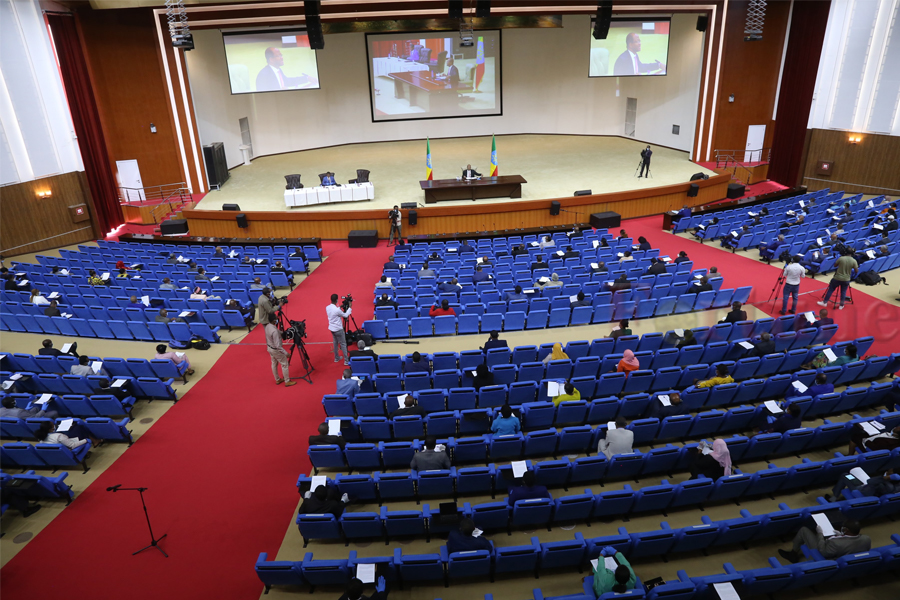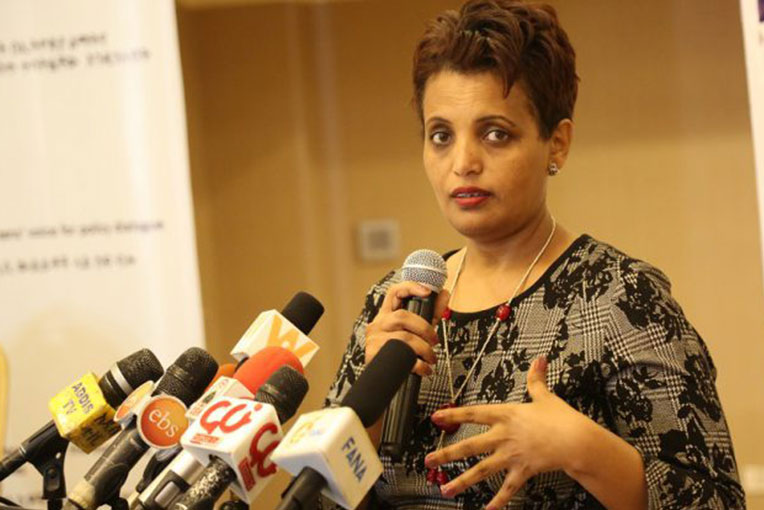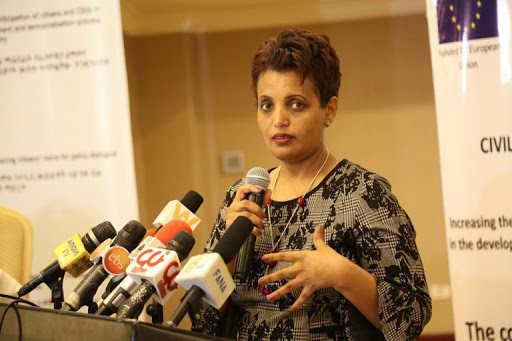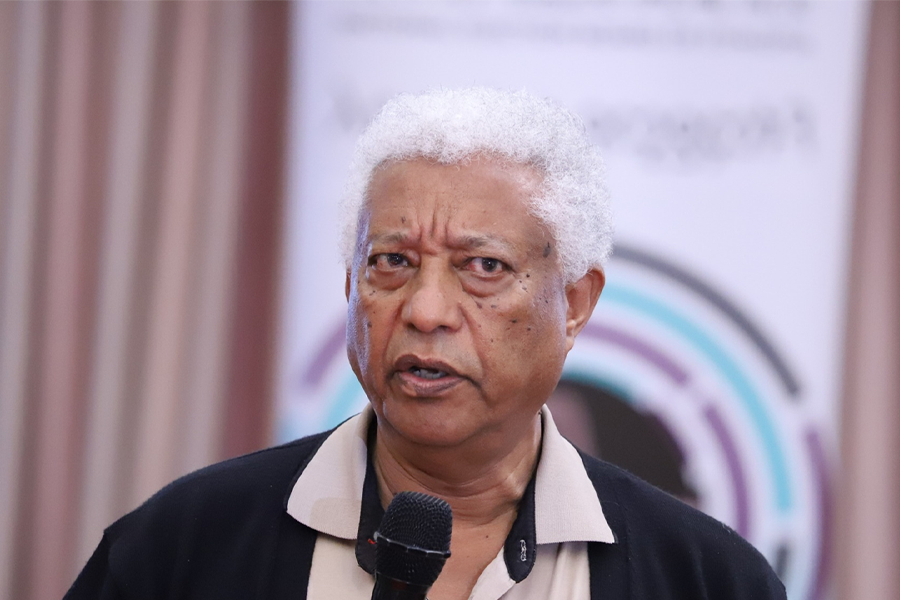
May 1 , 2020
By Mulugeta Aregawi
The assertion that the Constitution is silent on the issue of postponement of national elections is baseless. It has actually clearly provided for such circumstances, and a state of emergency is the answer, writes MulugetaAregawi, constitutional law professor at Addis Abeba University (AAU).
The National Election Board of Ethiopia (NEBE) recently announced that the COVID-19 pandemic had rendered impossible the continuation of its preparations for the parliamentary election scheduled for August 2020. Following this, parliament approved the declaration of the state of emergency (SoE) for five months on April 10, 2020.
Today, nobody seems to know for certain when the pandemic will dissipate and when the election will be conducted. As a result, questions relating to when, how and under what circumstance voters could go to the polls are being discussed and debated. Since such questions involve some unknowns, it is, intellectually speaking, more prudent to confine the discussion to a consideration of possible scenarios.
The first scenario assumes that the pandemic will ease in June or July without causing enough havoc to justify the continuance of the SoE. Under this scenario, while the Constitution provides for the dissolution of parliament or its own amendment to effect the desired change, it does not allow an extension of office terms by way of interpretation.
There is a reason for this.
If the pandemic ends by June or July, the SoE would be lifted. Both parliament and the executive would then have less than a couple of months to vacate their offices as their respective terms come to an end in September. The Prime Minister could employ Article 60 with the consent of parliamentarians, causing the dissolution of the House before the expiration of its term. A caretaker government would then be formed, and the election could be held in six months.
This time frame would give the Election Board time enough to prepare and conduct the postponed elections. As seamless as this route may appear, one must make a huge assumption: an emergency situation of the kind articulated under Article 93, will not occur.
Such an emergency could be caused by “external invasion; a breakdown of law and order which endangers the constitutional order” or a new epidemic of possibly epic proportions. Remember that this is imagined to happen on the watch of a caretaker government that cannot constitutionally “enact new proclamations, regulations or decrees.”
Who would then declare a state of emergency if that becomes necessary, since the parliament had already been dissolved? Would the caretaker government sit idly by if the country is invaded by foreigners or could it assume responsibility for defending the country without making a declaration of war? Would it legally mobilise resources, begin conscripting troops and conduct the defence of the country?
If no emergency occurs, Article 60 should serve the purpose. The act of invoking this article under the circumstance described above would obviously look purely technical, mechanical and inorganic. But it is constitutional, nonetheless.
The other avenue is amending the Constitution. The Constitution could be amended to provide for the extension of the term limit of parliament until the election is conducted and a new parliament is ushered in before the end of September. If this route is adopted, the Constitution commands that public consultations be held before the proposed amendment makes its way to the relevant authorities for approval.
The other scenario wrestles with the possibility that the pandemic worsens and continues past September. Parliamentarians whose terms in office are about to end would renew the mandate of the SoE. We will then be left with a parliament whose term will end in less than a month.
Under such circumstances, could their term limits be constitutionally extended so that we are not left with a command post but no parliament?
The term limit attached to the power of parliament cannot be extended without amending the Constitution.
One may argue that since the Constitution does not tell us what should happen if elections are not conducted within the constitutionally allowed time frame, the term of the HPR should be extended until the election is conducted and a new parliament convened. This argument is based on the imaginative contention that the framers of the Constitution could not have envisaged a command post without parliament.
The above line of reasoning further insists that the country is faced with extraordinary situations that justify the extraordinary measure of invoking the well-known doctrine of necessity and allow current parliamentarians to continue in spite of the expiration of their terms.
This is not an argument that would work, and to show this, we would have to take a closer look at our Constitution as well as that of the United States.
Article 8 of the Constitution openly declares that sovereignty resides in the “nations, nationalities and peoples” and that the Constitution is an expression of such sovereignty. It is this sovereignty that has, through the Constitution, expressed itself with regard to how federal power should be distributed, limited and controlled.
This is while Article 46 says that it is the states that have formed the federation, which is thus one of “coming together” and whatever power the federal government enjoys is only that part of the power given to it by the constituting states. The underlying principle of such an organisation for a federation was adopted from the country that, for the first time in history, managed to build a federal government on the foundation of the principle of popular sovereignty - the United States.
The Tenth Amendment to the US Constitution makes this crucial declaration: “The powers not delegated to the United States by the Constitution, nor prohibited by it to the states, are reserved to the States respectively, or to the people.”
Compare the amendment with Article 52 of the Ethiopian Constitution: “All powers not given expressly to the federal government alone or concurrently to the federal government and the States are reserved to the states.”
The fundamental difference between the two articles is that while the latter employs the word “expressly," a similar adverb is missing in the Tenth Amendment.
Why is it missing, and why is the omission significant?
The ratification of the US Constitution was characterised by the struggle of two contending forces that came to be known as the federalists and anti-federalists. As the former were concerned with the debilitating shortcomings of the Articles of Confederation and wanted a strong federal government, they tried to make sure that the Constitution reflected their interests.
The anti-federalists were wary of a strong centre, a bitter lesson they had picked up from their lives under colonial masters, and were not sure that the states’ rights would be adequately protected. They opposed the ratification and brought the process to a halt, a situation that gave rise to philosophical and political deadlock.
After about a year of protracted discussions, debates and negotiations, the impasse was overcome when the federalists agreed to the addition of the Tenth Amendment as a guaranty to legally limit the power of the federal government. It is significant enough that the amendment was able to limit the power of the federal government. What makes it more significant and consequential, however, was the way it was drafted.
The federalists did not want to settle for a weak union as much as the anti-federalists did not want to live under the rule of a strong centre. What turned out to be historically monumental was the debate that revolved around the wisdom of the inclusion of the adverb “express.”
The federalists were concerned that if they inserted “express” in the amendment, they would have a federal government that would be strictly and tightly bound by law, creating a weak centre. If they left it out of the amendment, however, they would have a government that could gradually strengthen itself by invoking implied powers and ultimately evolve into becoming what they wanted it to. The federalists finally had it their way.
Still, as the federalists did not feel that they had secured enough power to build a strong centre, they decided to press for more. As a result, they again intentionally added phrases such as “necessary and proper”, “general welfare” and “commerce clause” which were later used to expand the power of the federal government to the level we find today.
Unlike the American founding fathers, framers of Ethiopia’s Constitution were determined to have, as a matter of rule, a weak centre formed by strong states. Consequently, they deliberately inserted the adverb “expressly” into the text of Article 52, under the heading of “Powers and Functions of States.” The Ethiopian federal government, therefore, does not have implied powers and cannot exercise power that is not expressly given to it.
One may wonder if the federal parliament is out of luck. No power that is not expressively given to the federal government may go to them.
Is there any constitutionally accepted mechanism that, for instance, allows the House of Federation to interpret the Constitution in a manner that secures the parliamentarians more office time than clearly provided for in the Constitution?
Constitutional interpretation is the process by which meanings are assigned to words in a Constitution to enable legal decisions to be made that are justified by it. Semantic content is not always fully determinate, and this is especially true of words such as “privacy,” “equality,” “liberty,” and phrases such as "due process of law," "cruel, inhuman and degrading treatment” and “freedom of religion.” These words and phrases seem to lack the precise semantic content of phrases such as "five-year term" or "two-thirds majority."
The content expressed by the former could be highly contestable, and their understanding could vary from one interest to the other or from one generation to the next. As a result, they may from time to time call for interpretation that is normally expected to yield a more accurate and precise meaning.
Those that are expressed by the latter, however, are simply too precise to seek interpretation. The term limits of parliament fall under the category that does not need interpretation as can clearly be seen in the texts of the following constitutional provisions.
Article 54 commands that “members of the HPR shall be elected for a term of five years,” while Article 58 says that “the annual session of the house shall begin on Monday of the final week of the Ethiopian month of September … a new parliament is therefore expected to assume power on this day.” Finally, Article 58 states that “elections for a new house shall be concluded one month prior to the expiry of the house’s term.”
Those provisions are so clear that it is not apparent that interpretation is required. Just because one is stuck to the constitutionally unsubstantiated belief that the executive branch cannot, even during an emergency situation, function without parliament does not necessarily mean that all the above articles suddenly render themselves absurd or cause a vacuum that warrants interpretation.
The task of interpretation is not to create power out of thin air. It is rather to make words or phrases or sentences that appear in the Constitution more accurate and precise. It is difficult to imagine how the House of Federation could, by way of interpretation, extend the power of parliament when the Constitution has clearly limited its term of office to five years. This is unless the House of Federation decides to blatantly disregard what is clearly expressed in the Constitution. Interpretation is only necessary when there is a term with a contested meaning.
What is contestable about a clearly stated number of years? What is not clear about “five years"?
The jurisprudence behind this line of reasoning is that if the number of years an individual or body of individuals stays in power is fixed by the Constitution, it means that the sovereign’s wish is that term limits be strictly observed. If sticking to the term limit proves to be too problematic for the legal system to properly function, it is the sovereign that needs to change it through a constitutional amendment. It is, therefore, only the sovereign that can, as a matter of rule, change term limits during normal or peaceful times.
Here, it is crucial to remember the contention that the Constitution is silent about what could or should be done if and when the national election is postponed. The assertion that the Constitution is silent on the issue of postponement of national elections is baseless. It has actually clearly provided for such circumstances. To see why we need to begin from where many people seem to be in agreement.
It is not contested that the election was postponed because of the pandemic. And it is also clear that it was the same pandemic that has necessitated the invocation of Article 93 and hence the state of emergency. It is this very article that we need to examine because it is there that the sovereign has expressed its wish as to what could or should be done with the postponed election.
Can the SoE thus operate without parliament?
Yes. The proclamation that declared the SoE was a legal instrument that was properly and legitimately fashioned by the parliament and thus can survive its author just like other laws made by the same body unless repealed in part or in full. In this regard, the only concern that the SoE faces is that it has a six-month expiry date.
What happens when the term of the SoE runs out?
A state without parliament is not unheard of under the Ethiopian constitution. The framers have certainly provided for a state without a parliament as could easily be seen under Article 60. They allowed dissolution of the parliament because they imagined that a situation could, from time to time, occur that could render even a well-functioning parliamentarian system deadlocked.
The dissolution route simply shows that the framers preferred six months of executive rule than allow a dysfunctional parliament to continue and allow a potential political crisis to ferment. And such dissolution, it should be emphasised, is usually expected to occur in peacetime.
Whenever an emergency of a magnitude that could affect the very foundation of the normal course of governance occurs, the framers have devised an entirely different tool to deal with: Article 93. And it is this article that can tackle questions such as who is to do the renewal if there is no functioning parliament.
Article 93 of the Constitution mandates that a state of emergency may be declared if an epidemic occurs. During such a declaration, the Council of Ministers (COM) shall protect the country’s peace and sovereignty, maintain public security, law and order, suspend political and democratic rights to avert or contain the condition that required the declaration of the SoE. The initial term limit of the state of emergency is six months, but parliament can renew it for four months in perpetuity if the circumstances warrant it.
In its exercise of emergency powers, the Council cannot, however, change the name of the state; apply cruel and inhuman treatment; tamper with the right to equality before the law or limit rights of “nations, nationalities and peoples."
We can reasonably draw from this article that the rest of the articles of the Constitution are intentionally left defenceless because the framers wanted, as a matter of exception, to have a federal government that can do almost anything to defend the union.
The SoE proclamation allows the formation of a command post to take care of the daily activities of the government, or the state, depending on the severity of the emergency. The emergency power could expand if the crisis situation that gave rise to the SoE worsens provided the "necessity" requirement is fulfilled.
The parliament may know how things are when it approves SoE but cannot with certainty know how things could evolve once emergency power is put in place. It is therefore not impossible to imagine that the emergency situation could deteriorate to a point where even the very existence of the command post could be threatened.
What begins as a health crisis could quickly escalate into a full-scale humanitarian, security, economic, social and political crisis. Schools, markets, businesses, airlines, and borders could be closed, and tourism shut down. Our frantic efforts to battle the COVID-19 pandemic could lead to higher unemployment, social unrest, violent disruptions and civil disorder.
It is also not entirely inconceivable that the steps the command post may be forced to take to maintain order, such as the suspension of political and democratic rights, could be viewed with suspicion by segments of the public and opposition political leaders and could directly lead to riots and violent clashes with security forces.
When a confrontation between the state and citizens occurs, what started as a civil emergency to control a pandemic could be elevated into a state of siege where civil and political rights could severely be curtailed to prevent insurrection or organised acts of violence. This, in turn, could give rise to a possible foreign intervention and hence escalation of the emergency to the imposition of martial law.
It will not, therefore, be utterly unreasonable to surmise that it must have been such imaginative realisation that must have occupied the minds of the framers who drafted Article 93. In ceding such enormous power to the command post, the framers must have reasoned that during an emergency, the country needs to have a stronger federal government that could be in a better position to fight and avert the danger that could threaten the very survival of the union.
The above line of argument could be logically pushed further and approach the conclusion that the framers wished to render even Article 93 itself irrelevant.
Although the Council could request renewal of the state of emergency for an additional four months, it may however in practice disregard this requirement and stay in power indefinitely if circumstances are such that it is not possible to get the parliament to come to a session to approve the renewal request.
The Council could, therefore, ignore Article 93 without violating the terms of the Constitution as there is very little in it that protects the same article from causing its own demise. In other words, one could argue that the article that gives rise to the emergency power could not fully protect itself from the command post. And this line of reasoning is not a product of a fertile imagination.
It is not very difficult to see that the framers could have avoided the possible occurrence of such onslaught against Article 93 if they wanted to by shielding it from itself the way they did with Article 105. The latter, in relevant part, states that it cannot be amended without securing unanimity of those authorised to amend under the article itself.
The framers also could have expressly prohibited the SoE from messing with the article that establishes it altogether by declaring it to be non-derogable like they have done with articles 1, 18, 25 and 39. That they did not want to protect Article 93 from the command post simply indicates that the framers were so concerned about the nature of the crises they had in mind that they opted for a powerful command post that should stay in power until such time the crises is contained and normalcy is attained.
When we take this argument out of the abstract, it becomes clear what needs to happen. If the pandemic persists and worsens come September, the parliament should renew the state of emergency and vacate office as it is constitutionally required to do. The command post would then continue until its additional term of four months expires. If the pandemic still goes on, the SoE would, without a parliament, continue until the end of the pandemic.
Furthermore, even when the pandemic ends, the SoE would still continue for a while to deal with its aftermath, including not having a parliament. The emergency governance should, therefore, stay in place until the election is conducted and a new parliament convened.
PUBLISHED ON
May 01,2020 [ VOL
21 , NO
1044]


Fortune News | May 05,2020

Radar | Dec 19,2020

Agenda | Sep 02,2023

Commentaries | Oct 15,2022

Radar | Oct 23,2021

Election 2021 coverage | Mar 14,2020

Covid-19 | Mar 31,2020

Fortune News | Aug 07,2021

Fortune News | Oct 27, 2024

Sunday with Eden | Sep 28,2024

My Opinion | 131658 Views | Aug 14,2021

My Opinion | 128022 Views | Aug 21,2021

My Opinion | 125985 Views | Sep 10,2021

My Opinion | 123609 Views | Aug 07,2021

Dec 22 , 2024 . By TIZITA SHEWAFERAW
Charged with transforming colossal state-owned enterprises into modern and competitiv...

Aug 18 , 2024 . By AKSAH ITALO
Although predictable Yonas Zerihun's job in the ride-hailing service is not immune to...

Jul 28 , 2024 . By TIZITA SHEWAFERAW
Unhabitual, perhaps too many, Samuel Gebreyohannes, 38, used to occasionally enjoy a couple of beers at breakfast. However, he recently swit...

Jul 13 , 2024 . By AKSAH ITALO
Investors who rely on tractors, trucks, and field vehicles for commuting, transporting commodities, and f...

Jun 28 , 2025
Meseret Damtie, the assertive auditor general, has never been shy about naming names...

Jun 21 , 2025
A well-worn adage says, “Budget is not destiny, but it is direction.” Examining t...

Jun 14 , 2025
Yet again, the Horn of Africa is bracing for trouble. A region already frayed by wars...

Jun 7 , 2025
Few promises shine brighter in Addis Abeba than the pledge of a roof for every family...

Jun 29 , 2025
Addis Abeba's first rains have coincided with a sweeping rise in private school tuition, prompting the city's education...

Jun 29 , 2025 . By BEZAWIT HULUAGER
Central Bank Governor Mamo Mihretu claimed a bold reconfiguration of monetary policy...

Jun 29 , 2025 . By BEZAWIT HULUAGER
The federal government is betting on a sweeping overhaul of the driver licensing regi...

Jun 29 , 2025 . By NAHOM AYELE
Gadaa Bank has listed 1.2 million shares on the Ethiopian Securities Exchange (ESX),...